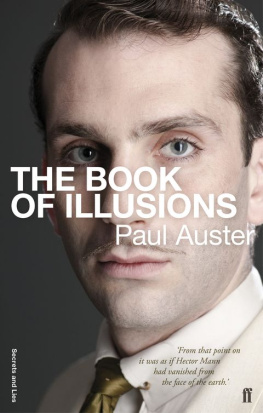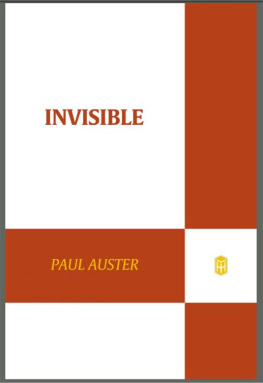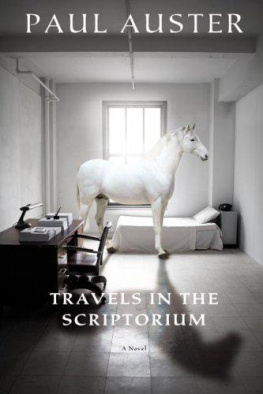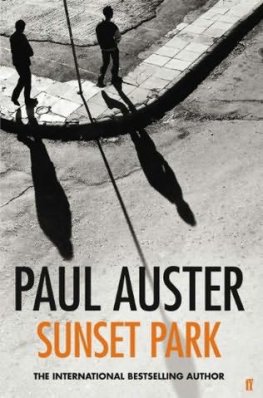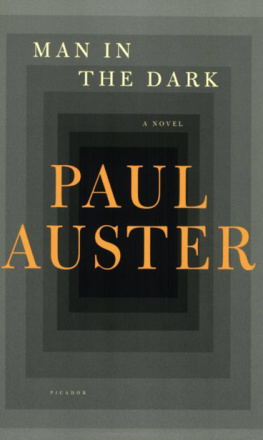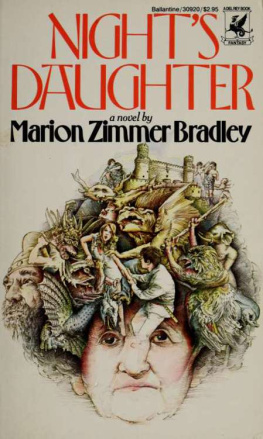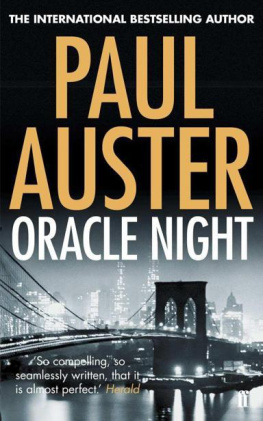EVERYONE THOUGHT HE was deade. When my book about his films was published in 1988, Hector Mann had not been heard from in almost sixty years. Except for a handful of historians and old-time movie buffs, few people seemed to know that he had ever existed. Double orNothing, the last of the twelve two-reel comedies he made at the end of the silent era, was released on November 23, 1928. Two months later, without saying good-bye to any of his friends or associates, without leaving behind a letter or informing anyone of his plans, he walked out of his rented house on North Orange Drive and was never seen again. His blue DeSoto was parked in the garage; the lease on the property was good for another three months; the rent had been paid in full. There was food in the kitchen, whiskey in the liquor cabinet, and not a single article of Hectors clothing was missing from the bedroom drawers. According to the Los Angeles Herald Express of January 18, 1929, itlooked as though he had stepped out for a short walk and wouldbe returning at any moment. But he didnt return, and from that point on it was as if Hector Mann had vanished from the face of the earth.
For several years following his disappearance, various stories and rumors circulated about what had happened to him, but none of these conjectures ever amounted to anything. The most plausible onesthat he had committed suicide or fallen victim to foul playcould neither be proved nor disproved, since no body was ever recovered. Other accounts of Hectors fate were more imaginative, more hopeful, more in keeping with the romantic implications of such a case. In one, he had returned to his native Argentina and was now the owner of a small provincial circus. In another, he had joined the Communist Party and was working under an assumed name as an organizer among the dairy workers in Utica, New York. In still another, he was riding the rails as a Depression hobo. If Hector had been a bigger star, the stories no doubt would have persisted. He would have lived on in the things that were said about him, gradually turning into one of those symbolic figures who inhabit the nether zones of collective memory, a representative of youth and hope and the devilish twists of fortune. But none of that happened, for the fact was that Hector was only just beginning to make his mark in Hollywood when his career ended. He had come too late to exploit his talents fully, and he hadnt stayed long enough to leave a lasting impression of who he was or what he could do. A few more years went by, and little by little people stopped thinking about him. By 1932 or 1933, Hector belonged to an extinct universe, and if there were any traces of him left, it was only as a footnote in some obscure book that no one bothered to read anymore. The movies talked now, and the flickering dumb shows of the past were forgotten. No more clowns, no more pantomimists, no more pretty flapper girls dancing to the beat of unheard orchestras. They had been dead for just a few years, but already they felt prehistoric, like creatures who had roamed the earth when men still lived in caves.
I didnt give much information about Hectors life in my book. The Silent World of Hector Mann was a study of his films, not a biography, and whatever small facts I threw in about his offscreen activities came directly from the standard sources: film encyclopedias, memoirs, histories of early Hollywood. I wrote the book because I wanted to share my enthusiasm for Hectors work. The story of his life was secondary to me, and rather than speculate on what might or might not have happened to him, I stuck to a close reading of the films themselves. Given that he was born in 1900, and given that he had not been seen since 1929, it never would have occurred to me to suggest that Hector Mann was still alive. Dead men dont crawl out from their graves, and as far as I was concerned, only a dead man could have kept himself hidden for that long.
The book was published by the University of Pennsylvania Press eleven years ago this past March. Three months later, just after the first reviews had started to appear in the film quarterlies and academic journals, a letter turned up in my mailbox. The envelope was larger and squarer than the ones commonly sold in stores, and because it was made of thick, expensive paper, my initial response was to think there might be a wedding invitation or a birth announcement inside. My name and address were written out across the front in an elegant, curling script. If the writing wasnt that of a professional calligrapher, it no doubt came from someone who believed in the virtues of graceful penmanship, a person who had been schooled in the old academies of etiquette and social decorum. The stamp was postmarked Albuquerque, New Mexico, but the return address on the back flap showed that the letter had been written somewhere elseassuming that there was such a place, and assuming that the name of the town was real. Top and bottom, the two lines read: Blue Stone Ranch; Tierra del Sueo, New Mexico. I might have smiled when I saw those words, but I cant remember now. No name was given, and as I opened the envelope to read the message on the card inside, I caught a faint smell of perfume, the subtlest hint of lavender essence.
Dear Professor Zimmer, the note said. Hector has read yourbook and would like to meet you. Are you interested in payingus a visit? Yours sincerely, Frieda Spelling (Mrs. Hector Mann).
I read it six or seven times. Then I put it down, walked to the other end of the room, and came back. When I picked up the letter again, I wasnt sure if the words would still be there. Or, if they were there, if they would still be the same words. I read it six or seven more times, and then, still not sure of anything, dismissed it as a prank. A moment later, I was filled with doubts, and the next moment after that I began to doubt those doubts. To think one thought meant thinking the opposite thought, and no sooner did that second thought destroy the first thought than a third thought rose up to destroy the second. Not knowing what else to do, I got into my car and drove to the post office. Every address in America was listed in the zip code directory, and if Tierra del Sueo wasnt there, I could throw away the card and forget all about it. But it was there. I found it in volume one on page 1933, sitting on the line between Tierra Amarilla and Tijeras, a proper town with a post office and its own five-digit number. That didnt make the letter genuine, of course, but at least it gave it an air of credibility, and by the time I returned home, I knew that I would have to answer it. A letter like that cant be ignored. Once youve read it, you know that if you dont take the trouble to sit down and write back, youll go on thinking about it for the rest of your life.
I havent kept a copy of my answer, but I remember that I wrote it by hand and tried to make it as short as possible, limiting what I said to just a few sentences. Without giving it much thought, I found myself adopting the flat, cryptic style of the letter I had received. I felt less exposed that way, less likely to be taken as a fool by the person who had masterminded the prankif indeed it was a prank. Give or take a word or two, my response went something like this: Dear Frieda Spelling.Of course I would like to meet Hector Mann. But how can I besure hes alive? To the best of my knowledge, he hasnt been seenin more than half a century. Please provide details. Respectfullyyours, David Zimmer.
W e all want to believe in impossible things, I suppose, to persuade ourselves that miracles can happen. Considering that I was the author of the only book ever written on Hector Mann, it probably made sense that someone would think Id jump at the chance to believe he was still alive. But I wasnt in the mood to jump. Or at least I didnt think I was. My book had been born out of a great sorrow, and now that the book was behind me, the sorrow was still there. Writing about comedy had been no more than a pretext, an odd form of medicine that I had swallowed every day for over a year on the off chance that it would dull the pain inside me. To some extent, it did. But Frieda Spelling (or whoever was posing as Frieda Spelling) couldnt have known that. She couldnt have known that on June 7, 1985, just one week short of my tenth wedding anniversary, my wife and two sons had been killed in a plane crash. She might have seen that the book was dedicated to them (

